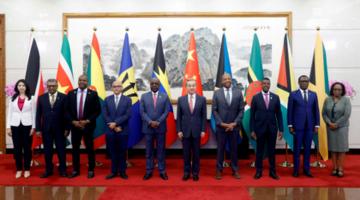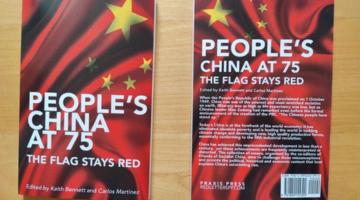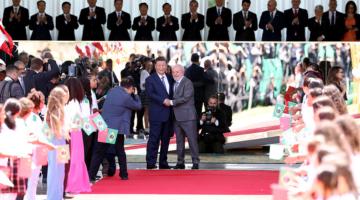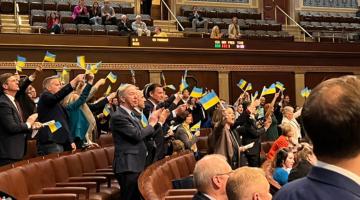The $250 billion "Innovation and Competition Act" leverages industrial policy to ratchet up militarization and potentially instigate global conflict with China.
This article originally appeared in The Nation.
Congress is itching to pass a sweeping bipartisan package that threatens to enshrine a new Cold War, this time against China, and they’re counting on the American public’s inattention to get it through by the end of the year. After months of stalling in the House, and a failed attempt to attach the legislation to the annual defense bill, majority leader Chuck Schumer and Speaker Nancy Pelosi struck a deal this week for a bicameral conference on the anti-China legislation.
The US Innovation and Competition Act is a massive piece of legislation purporting to make the United States more “competitive” with China economically, politically, and technologically. Mainstream media outlets and lawmakers have framed the bill as the most expansive industrial policy legislation in US history, and as being crucial for countering China’s economic rise.
But this $250 billion “innovation” bill is nothing more than a dangerous escalation in a multipronged offensive against China. The Innovation and Competition Act leverages industrial policy to ratchet up US militarization and potentially instigate global conflict—all while hindering the global fight against climate change. And just as the “War on Terror” led to a systematic assault on Muslims and people of color, an unbridled security state, and mass domestic surveillance, the language of national security and competition that will arise around a new Cold War could serve to justify racist and repressive policies here at home.
The Innovation and Competition Act would ramp up militarization in the Indo-Pacific, undermine nuclear arms control, and dedicate hundreds of millions of additional dollars to expanding US military presence in the region. Entire sections of the bill are dedicated to deepening defense cooperation in Latin America and the Caribbean, authorizing $12 million annually from 2021 to 2026 for the International Military Education and Training Program, as well as other countries in the Indo-Pacific region, including India and the Philippines. It would also increase Taiwan and Japan’s military capacity. The USICA would “dramatically change the status quo on Taiwan in a way I think is super-dangerous,” one House Democratic staffer told The Nation.
Domestically, the bill would establish an anti-China bureaucratic apparatus tasked with hunting down “undue” Chinese influence in the United States, which critics warn would exacerbate the racial profiling of Chinese Americans and Chinese nationals living in the US and inflame anti-Asian racism. A provision in the Innovation and Competition Act would enact a policy “to enable the people of the United States, including the private sector, civil society, universities and other academic institutions, State and local legislators, and other relevant actors to identify and remain vigilant to the risks posed by undue influence” of the Communist Party of China in the US and to “implement measures to mitigate the risks.” It allocates $300 million a year for 2022 to 2026 to create a “Countering Chinese Influence Fund,” and would also mandate a comptroller report on the activities of US Sister City participants who partner with countries like China. (There are over 100 US sister cities shared with China.)
None of this is unprecedented, of course. The United States has a long history of treating Asian Americans and immigrants with unfounded suspicion and enforcing racism through policy. In Chae Chan Ping v. United States, a 1889 Supreme Court decision that upheld the Chinese Exclusion Act, Washington justified the racist policies “on grounds that Chinese immigrants were ‘agents’ of China and that their mere presence in the country was akin to war, even if no actual hostilities were taking place,” as Columbia University history professor Mae Ngai wrote in March. And in recent years, US intelligence agencies have increased surveillance and targeting of students and academics of Chinese descent. “I think what we can expect is that we’re going to have a much more supercharged version of what we’ve been seeing over the past few years,” said Anlin Wang, a member of Democratic Socialists of America and Reclaim Philadelphia.
Senate Democrats passed the Innovation and Competition Act over the summer with overwhelming bipartisan support, and many of the most troubling aspects of the bill also have broad support in the House. Representative Gregory Meeks, chair of the House Foreign Affairs Committee, has his own version of the legislation, and pushed against the chamber’s “rubber-stamping” the Senate version. His version, the EAGLE Act, is meant to be less aggressive and better on climate. But it doesn’t meaningfully change the substance of the policy, and has less support among Republicans than the Senate version.
Vermont Senator Bernie Sanders was the only senator who caucuses with Democrats to vote against the bill. Not long after the vote, Sanders expanded on his position in the pages of Foreign Affairs, imploring DC leaders not to start another Cold War. “Instead of extolling the virtues of free trade and openness toward China, the establishment beats the drums for a new Cold War, casting China as an existential threat to the United States,” Sanders wrote. “We are already hearing politicians and representatives of the military-industrial complex using this as the latest pretext for larger and larger defense budgets.”
This hawkish consensus on China has been years in the making, and President Joe Biden shows no intention of diverging from it. Despite his declaration at the United Nations that “we are not seeking a new Cold War” with China or a “world divided into rigid blocs,” the Biden administration has been just as aggressive in his approach to China as former Presidents Donald Trump and Barack Obama. Members of both parties, including most liberals and many progressives, are eager to fuel conflict between the two nuclear powers. Republican Senator Jim Inhofe has said that “we’re in the most dangerous time in our lifetime.” On the Democratic side, there are lawmakers like Representative Elaine Luria, a former Navy officer who rakes in campaign cash from some of the biggest defense contractor PACs. Luria doesn’t just want bigger military budgets; she wants Congress to pre-authorize war with China.
For months, Pentagon officials, lawmakers, and the national media have focused on China’s growing military capabilities to make the case that the country poses the biggest military threat to the United States and the world. But discussion of the so-called Chinese threat is rarely ever in touch with reality. There is only one country that maintains nearly 800 military bases in at least 80 countries around the world, spends more on the military than the next seven countries combined, and has used nuclear weapons in war. The same country has been directly responsible for countless military interventions. And it isn’t China.
Democratic Socialists of America’s International Committee is among the groups organizing against the looming passage of the US Innovation and Competition Act, and broader US escalation against China. Grayson Lanza, a member of the Asia and Oceania subcommittee and cochair of Orlando’s DSA chapter, echoed the idea that one of the biggest dangers of the bill is that it would create a permanent apparatus for antagonizing China.
“As a Floridian, I’m very in tune with the kind of bureaucracy that develops for the specific targeting of countries, for sanctions and antagonism,” Lanza said, referring to the influence that the anti-Cuban bureaucracy has had both in his state and on the federal level. “Once this gets put into place, and there’s a little bit of momentum behind it, you can’t really undo it. People’s jobs, their careers are going to be based around you, the United States, being an enemy of China.”
There’s also the “profound unfairness” of Washington’s allocating our resources and money into antagonizing China when US infrastructure is crumbling and Americans are without health care and paid leave, Lanza added. It’s a significant amount of money going not just to foreign militaries, but to reinforcing US propaganda networks abroad. One of the measures in the bill, for example, would train journalists “on investigative techniques necessary” to report on China’s Belt and Road Initiative.
“Maybe you don’t like China, but do you really think this is a worthy investment of your tax dollar? Probably not,” Lanza said. “Most people want their money spent on them. They want to see it in their communities. They want to see it in their infrastructure. They want to see it in their schools.”
In a statement this week against the $778 billion Pentagon budget, Sanders criticized the Innovation and Competition Act for including $52 billion in “corporate welfare, with no strings attached, for a handful of extremely profitable microchip companies” and a $10 billion “handout” to Jeff Bezos for space exploration. “Isn’t it strange how even as we end the longest war in our nation’s history, concerns about the deficit and national debt seem to melt away under the influence of the powerful Military Industrial Complex?” Sanders said.
Aída Chávez is The Nation’s D.C. correspondent. She was previously a congressional reporter at The Intercept. Chávez has also written for The Washington Post, The Hill, and Refinery29. She studied journalism and political science at Arizona State University and is currently in a heterodox economics master’s program at the City University of New York.



















